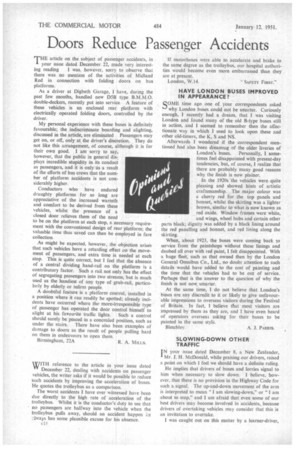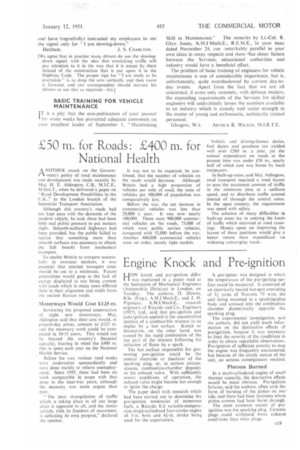SLOWING-DOWN OTHER TRAFFIC
Page 54

Page 57

If you've noticed an error in this article please click here to report it so we can fix it.
IN your issue dated December 8, a New Zealander, 1 Mr. J. H. McDonald, while praising our drivers, raised a point on which I feel we should have a definite ruling.
He implies that drivers of buses and lorries signal to him when necessary to slow down. I believe, however, that there is no provision in the Highway Code for such a•signal. The up-and-down movement of the arm is interpreted to mean "1 am slowing-down," or "1 am about to stop," and I am afraid that even some of our best drivers may become involved in accidents, because drivers of overtaking vehicles may consider that this is an invitation to overtake.
I was caught out on this matter by a learner-driver,
and have (regretfully) instructed tiny employees to use the signal only for ": I am slowing-down."
Hexharn. J. S. CHARLTON.
[We agree that irk practice many drivers do use the slowingdown signal, with the idea that overtaking traffic will pay attention to it in the way that it is meant by them instead of the construction that is put upon it in the Highway Code. The proper sign for "I urn ready to he overtaken " is to drop the arm vertically and then move it forward, and our correspondent should instruct his drivers to use this as required.---Eo.]
BASIC TRAINING FOR VEHICLE MAINTENANCE
IT is a pity that the non-publication of your journal 1 for some weeks has prevented adequate comments on your excellent leader of September 1, " Maintaining
Skill in Maintenance." The remarks by Lt.-Col. R.
Glyn 'Jones, A,M.I. R.E.M.E.,. in your issue
dated November 24, run remarkably parallel to your own. ideas in many respects and show that closer liaison between the Services, educational authorities and industry would have a beneficial effect.
The problem of basic training of engineers for vehicle maintenance is one of considerable importance, but is, unfortunately, quite overshadowed by current day-to
day events. Apart . from the fact that we are all concerned, ir some only remotely, with defence matters, the expanding requirements of the Services for skilled engineers will undoubtedly lessen the numbers available to an industry which is already well under strength in the matter of young and enthusiastic, technically trained personnel.
Glasgow, W.4. ARTHUR R. WILSON, M.I.R.T.E.




































































































